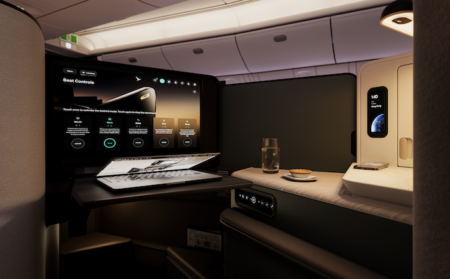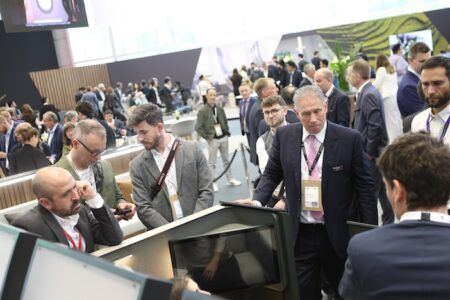Some of the biggest names in aviation are squaring up for a showdown in Hamburg. The finalists of the 2017 Crystal Cabin Awards have been revealed, with 21 products and ideas from names such as Bombardier, Delta Air Lines and United Airlines, with innovations ranging from ‘magic’ mirrors to business class suites, to seat cushions all competing.
85 entrants from 21 nations were shortlisted for the Awards, which the judging panel whittled down to 21 finalists, with a further round of voting set to decide seven winners of the coveted trophies. The winners will be announced on the first evening of the Aircraft Interiors Expo (April 4-6, 2017) in Hamburg, Germany.
Above: Will the Delta One Suite triumph over United’s Polaris program?
The final in the Cabin Concepts category is particularly exciting this year, with three major international brands going head-to-head. Delta Air Lines is competing with its Delta One Suite, an enclosed business class suite with privacy partitions, which is initially being implemented in Delta’s A350s. United Airlines’ Polaris business class is also in the running, with its innovative cabin configuration which offers all-aisle access seats in a density neutral layout, without compromising space or comfort. Also in contention for the best cabin concept is Canadian aircraft manufacturer Bombardier with the cabin for its C Series, the first completely new short and medium-haul airliner for 30 years.
Above: K-Reflexion reflects the passenger, and the flight status
In the Material & Components category, the K-Reflexion Mirror from Krüger Aviation is a first plastic mirror which, thanks to its semi-transparent structure, can display safety announcements, product information and tips for the destination in the onboard lavatory. Meanwhile Studio Moderna Bologna has concentrated its efforts primarily on long-haul aviation seating, creating elastic material units for aircraft seats which provide optimal distribution of body weight. Flexibility is the order of the day for Diehl Aircabin, which has added interest to wall surfaces with the help of its direct printing method that allows colors and patterns to be added without having to remove panels.
Above: Zodiac’s system gives ‘binsight’ into available overhead stowage space
The innovations in the Cabin Systems category are less obvious to the passenger, but still of great benefit. The Watchdog from Airbus addresses the problem of accidental activation of the emergency escape chutes on the ground when crew members open the aircraft doors, by using a sensor that warns whenever there is a movement near the door handle. Zodiac Aerospace has also come up with a sensor, a cabin baggage management system for overhead compartments that sees lights on the lockers indicate free space for cabin baggage, as well as offering a little extra space for cases. Finally, Diehl Aerospace has collaborated with the Lucerne University of Applied Sciences and Arts, to combine data and electricity cables with ‘Power Line Communication’, which allows “free-loading” of data flows using existing power cabling on board, resulting in materials and therefore weight savings.
Above: It may look like a sci-fi robot, but GermFalcon comes in peace
Efficiency and sustainability are at the forefront in the Greener Cabin, Health, Safety and Environment category. Amongst the finalists is GermFalcon, a cleaning device for cabins that uses ultraviolet C light to remove bacteria and viruses from seats and other surfaces without the use of chemical agents. The Revolution Toilet from Zodiac Aerospace also aims to fight bacteria by using special vents, as well as saving water. Airbus successfully pushed the ReTrolley all the way into the finals, a rubbish collection trolley that allows the crew to sort and compress waste while they pass through the cabin.
Above: This simple idea from Diehl adds extra functionality to the galley space
Bombardier is also competing in the Passenger Comfort Hardware category, with its concept of barrier-free toilets for the CRJ range of aircraft. They are facing off with Airbus, whose Smart Cabin Reconfiguration solution for moving aircraft seats on rails, which promises minimal effort in both the initial installation and crew operation. The idea of creating a benefit with minimal effort for the crew also brought Diehl Comfort Modules into the finals, with its bar module that can be integrated into the galley in just a few simple steps, transforming a functional kitchen space into a bar or a duty-free sales counter within seconds.
Above: Airbus’s WAIC system removes weight and complexity by reducing wiring
Inflight entertainment and connectivity is again a major field of growth, with the Electronic Systems category having two finalists that have developed wireless connectivity solutions. Lufthansa Technik’s ‘niceview mobile’ product offers passengers a way to follow their journey with interactive maps on their personal mobile devices, while Global Eagle Entertainment has submitted a complete entertainment portal, allowing passengers to surf the internet, watch films and read magazines on their personal electronic devices. Airbus made it to the finals in this category (thus being a finalist in four categories) with a radio-based wireless communication (WAIC – Wireless Avionics Intra-Communications) system that enables smoke detectors, lighting and temperature regulation to be controlled with a patented radio frequency.
Above: Myseat helps reduce the stress of being lost, from check-in to seat
The final category – the University category – brings together creative student concepts. Repeating its success from last year, Delft University of Technology has more than one idea in the final: ‘myseat’ is the equivalent of a parking guidance system for passengers, accompanying them all the way from check-in to their seat using Bluetooth technology for a more structured boarding process. Meanwhile, Delft’s Revitalisation System turns the cabin seating upholstery into a game controller, with body movements controlling the on-board entertainment system for an in-seat workout. Finally, Hamburg University of Applied Sciences has devised the Smart Onboard Wheelchair, which enables wheelchair users to roll the seat directly over a toilet.
The seven winners of the Crystal Cabin Award 2017 will be announced during Aircraft Interiors Expo at a gala event to be held on the evening of April 4 at the Hotel Atlantic Kempinski in Hamburg. Beofre then, all of the finalists have to personally answer the critical and probing questions of the 29 international experts on the judging panel – airline representatives, professors, aircraft manufacturer representatives, and journalists – and present their projects in an “elevator pitch”.




